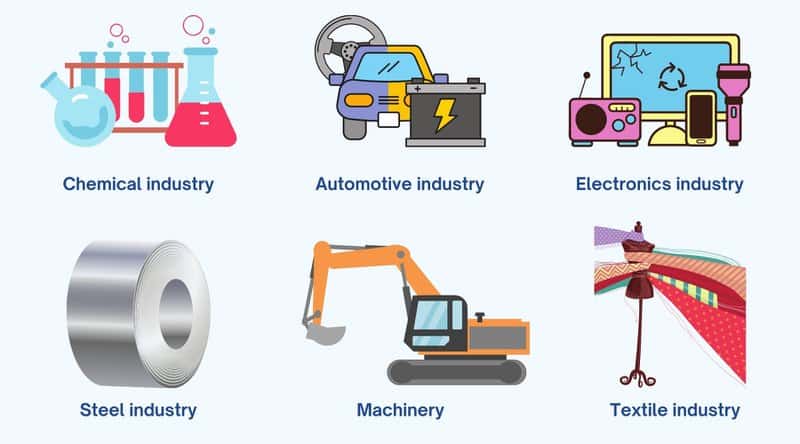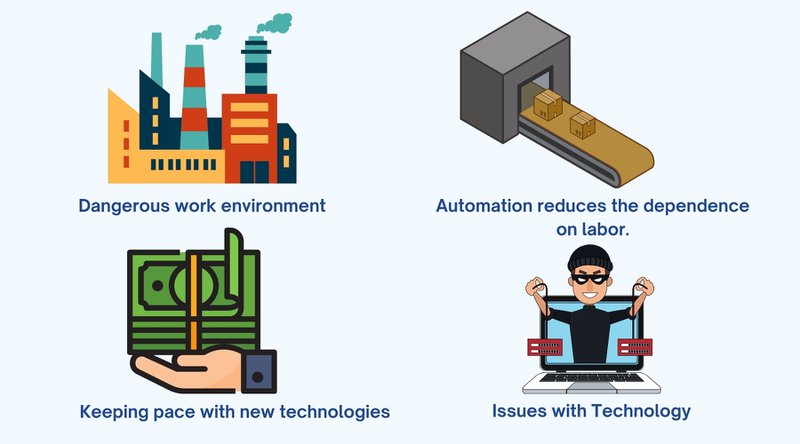Choosing a career path is perhaps one of the most critical decisions in a person’s life. The many choices have made it easier and difficult for people to enter the workforce. So at Totempool, we have a series of posts covering career choices. This article will discuss ‘Is capital goods a good career path?’
The article will discuss jobs you can search for in the industry and what requires you to get to an established position there.
Table of Contents
- Is Capital Goods A Good Career Path?
- What Are Capital Goods?
- What Are Capital Goods Examples?
- What Are The Industries in Capital Goods?
- What are The Jobs Available in the Capital Goods Sector?
- Advanced Career Options
- Pros of a Career in the Capital Goods Sector
- Cons of a Career in the Capital Goods Sector
Without further ado, let’s go straight to the answer.
Is Capital Goods A Good Career Path?
Yes, absolutely! Capital goods offer a range of exciting job opportunities across various industries. You could be working on designing cutting-edge technology, managing large-scale projects, or improving existing systems. With rising demand for these products globally, there’s no shortage of opportunities for those with the skills and knowledge to succeed in this field.
Moreover, careers in capital goods can be advantageous both professionally and financially. As companies invest heavily in research and development to stay ahead of the competition, they also offer competitive salaries and benefits packages to attract top talent.
What Are Capital Goods?

Generally, there are two types of goods, capital goods, and consumer goods. Consumer goods are the final goods that the end customer uses. It can be referred to as goods or services; consumer goods can be durables, non-durables, or pure services.
Capital goods are defined as tangible items that are manufactured, and these manufactured goods are subsequently used to produce a consumer good or a final product. Fixed assets are also a form of capital goods that come in three major categories – property, plants, and equipment.
A product can be classified as a consumer or capital good based on the following parameters-
- Quantity
- End-user
- The investment required
- Buyer
The same good can be a consumer or capital good, depending on the situation. Here’s an example: An individual purchases a laptop for personal use. The laptop is a consumer good in this case. Whereas if a school orders 2000 laptops, it is a capital good.
The capital goods industry is of strategic importance to the economic independence and security of a country.
What Are Capital Goods Examples?
Some examples of capital goods are:
- Chemicals: Oil, minerals, water, and natural gas.
- Automotive: Components for cars, bikes, trucks, and other vehicles.
- Electronics: Semiconductors, telecommunication, industrial, and consumer electronics components.
- Steel.
- Machinery.
- Textile: cotton, wool, nylon.
See the following section for more details about each industry.
What Are The Industries in Capital Goods?

The capital goods sector consists of industries that assist other businesses. Subsequently, these businesses produce products and services for the end consumer. This section shall focus on some industries that comprise the capital goods sector. That, in turn, will help us answer the question -‘ is capital goods a good career path?
Chemicals Industry
As the name suggests, the chemicals industry uses chemicals to produce products like paints, adhesives, detergents, soaps, etc. Firms use natural substances like oil, minerals, water, and natural gas to create end products.
Automotive Industry
This industry makes cars, bikes, trucks, and other vehicle components. The automotive sector refers to businesses that create vehicle parts rather than dealers or salespeople who sell them.
Electronics Industry
This occupies the largest share in the capital goods sector. The electronics industry consists of the following subdivisions: semiconductors, telecommunication, industrial, and consumer electronics.
The primary function of this industry is to supply parts to electric industries to manufacture electronic items.
Steel Industry
This industry produces steel products and recycles steel scrap. Since steel is an important construction material, it is in high demand for various projects.
Machinery industry
This industry manufactures the heavy machines and equipment necessary to create goods. Moreover, this sector also includes businesses that supply other companies with equipment. The public generally does not buy these items.
Textile Industry
The textile industry produces fabrics such as cotton, wool, and nylon. It also produces coloring substances such as dyes, and these products then act as raw materials for the apparel industry.
What are The Jobs Available in the Capital Goods Sector?
The question – Is capital goods a good career path can be answered better by looking at some available job opportunities. These jobs are typically in the manufacturing sector. This sector involves the creation of new products from raw materials or the assembly of components. Manufacturing helps create products for a variety of industries. Given below is a list of some jobs in this sector:
Assembler
The primary function of an assembler is to understand how different parts come together to create the final product. He should know how to measure and connect various components. Technical know-how is necessary, but a high formal education or qualifications is not required. An assembler makes $ 32,592 on average annually.
Warehouse Worker
A warehouse worker’s responsibilities include stocking various products, placing an order, packaging, and preparing orders for delivery. Additionally, they are also entrusted with tracking and unloading shipments. Warehouse workers require high efficiency in their jobs. The average annual salary of a warehouse worker is $33,841 per year.
Quality Control Inspector
Quality is the cornerstone of manufacturing. The quality control inspector must ensure that various quality standards are met. These quality standards are reviewed regarding processes, specifications, materials used, etc. A quality control inspector should be able to pay attention to minute details. A quality control inspector earns over $40,000 per year on average.
Manufacturing Technician
They have to set up and operate the equipment. Additionally, manufacturing technicians inspect and test products and assemblies. A manufacturing technician’s responsibility is to ensure the equipment runs smoothly, which involves setup, calibration, and machinery maintenance. A manufacturing technician makes $47,985 each year.
Manufacturing Engineer
They look after the machinery and the overall process. One of their key responsibilities is to identify areas of improvement in the equipment and the process. Further, he also oversees the production line, efficiency, and troubleshooting aspects. He is also tasked with developing innovative solutions to enhance production. Finally, his salary is close to $80,000 per year.
Advanced Career Options
The capital goods sector offers several senior or specialized positions beside the abovementioned careers. Here are the details of these advanced options.
Computer-Aided Design(CAD) Technician
CAD technicians develop expertise in designing and manufacturing products using CAD software. They typically study industrial technology and technology management. Their annual average salary is $47,000
Mechatronics Engineering Technician
He applies a combination of engineering theories such as electronics, computer sciences, and mechanical to develop, modify and test machines. So, these machines are used in various stages of production. Also, a mechatronics engineer makes close to $90,000 per year on average.
Fabricator
A fabricator has to create a finished product. He puts together the components according to an instruction manual to do. Moreover, fabricators have to be familiar with blueprint designs. He needs to be comfortable with technology and possess the high skill. His mean salary is upwards of $38,000 per year.
Robotics Engineer
A robotics engineer works on designing automation tools and electromechanical robots. These robots can be programmed to perform repetitive or hazardous tasks, creating a safer working environment for everyone. Finally, a robotics engineer earns $93,364 on average annually.
Manufacturing Manager
A manufacturing manager schedules and supervises production and is responsible for most of the planning, like equipment layout and process flow. Additionally, he is tasked with workforce management. A manufacturing manager earns $100,000 on average each year.
Director of Manufacturing
The manufacturing director is closely aligned with the top management. He sets production goals. Furthermore, he hires supervisors and managers. He is also responsible for ensuring the factory meets the highest safety standards. Directors of manufacturing typically earn about $200,000 each year.
Other typical available jobs, not related only to capital goods, are Financial, Marketing HR, Supply Chain, Engineer, at the levels of Associates, Assistants, Analysts, Managers, Directors, and VPS.
How Many Jobs Are Available in the Capital Goods Sector?
According to the career website Indeed, more than 40 thousand jobs are available in capital goods in the USA.
Pros of a Career in the Capital Goods Sector

Now that we have explored career options in the capital goods sector in detail. Let us consider why one should consider pursuing a career in this industry.
Plenty of entry-level opportunities.
The capital goods sector has several positions that require no previous work experience. One can get on-the-job training, which is more hands-on than certifications or internships.
Moreover, exposure to several diverse industries is a big plus. One can work in manufacturing, pharma, aerospace, textiles, etc. A person can pick up valuable skills to help him gain work experience in the long run.
Working on something real.
This sector involves the creation of tangible products. Therefore one gets to physically see the results of their efforts which is immensely satisfying. This is very different from jobs where the results are often abstract.
Opportunities to go up the ladder.
There are many options for employees to advance their careers in this sector. An individual can move from an entry-level production role to a leadership position like a plant operator or a quality control inspector.
Avoiding a sedimentary lifestyle.
A manufacturing job involves a lot of standing, running around, lifting objects, etc. The physical aspect of a manufacturing job keeps one active and healthy, and it also prevents boredom that tends to be associated with desk jobs.
Cons of a Career in the Capital Goods Sector

We have reached the next stage of finding the answer Is capital goods a good career path? Despite the positives, there exist specific glaring issues in this sector. Let us examine these below:
Dangerous work environment.
Factories are the heart and soul of the capital goods sector. And with all the heavy machinery, equipment, and chemicals involved, work is highly hazardous. So, it is necessary that maintaining the highest safety standards is given the highest priority.
Automation reduces the dependence on labor.
The capital goods sector was significant for people with limited formal education. Now, the increase in technology is slowly replacing workers from assembly-line jobs, a hallmark of the industrial revolution.
Keeping pace with new technologies.
Installing robots or using the latest technologies is excellent. But, not all firms can afford this, leading to a very high barrier to entry.
Issues with Technology.
The same technology that makes fantastic things possible is vulnerable to security attacks. Individuals with malicious intentions can gain control of the machinery and cause havoc. Internet of Things (IoT) devices is particularly vulnerable as each has a different entry point in the system.
In Conclusion
Are you seeking a career path that offers stability, growth, and endless opportunities? Look no further than a career in capital goods! Capital goods are the backbone of economies around the world. These vital products, from heavy machinery to complex systems, help drive progress and fuel innovation. But is it a good career choice? Absolutely! The capital goods sector is an excellent career choice for people interested in creating things.
It is also an ideal choice if one wishes to be a part of the global supply chain- the engine that keeps the world up and running. So we have answered the question “Is capital goods a good career path?” for you – now it’s time for you to choose!
If you want to know more about other career paths, check out this list on Totempool. You can make your choices with solid information before moving to a particular industry.
As more industries are published on the website, we will keep updating the list for you. If you want to learn how to choose your career path, check out this article.

Ranu Kumari is a Professional Writer and a Marketing enthusiast who currently runs her own Marketing Consultancy, LatitudeBOX. She has written promotional articles for multiple brands and has published her work in Scopus indexed journals. She is passionate about expressing her thoughts and ideas to connect with her readers in a voice that they understand.

Excellent article you have here, perfect information.
Thank you and keep up the good work